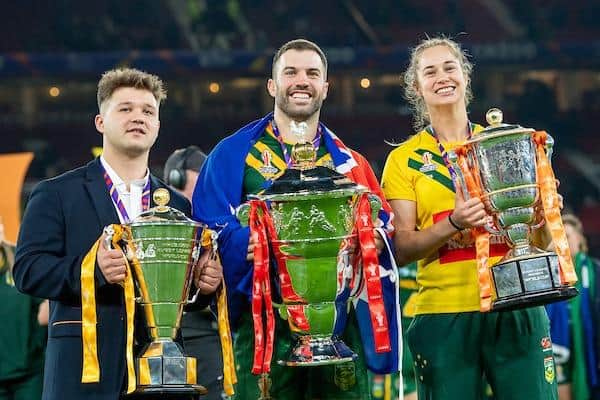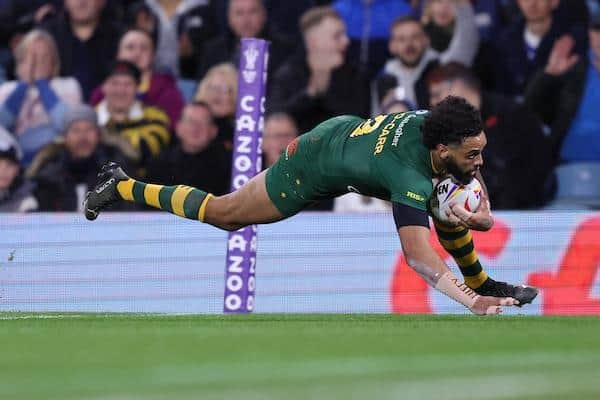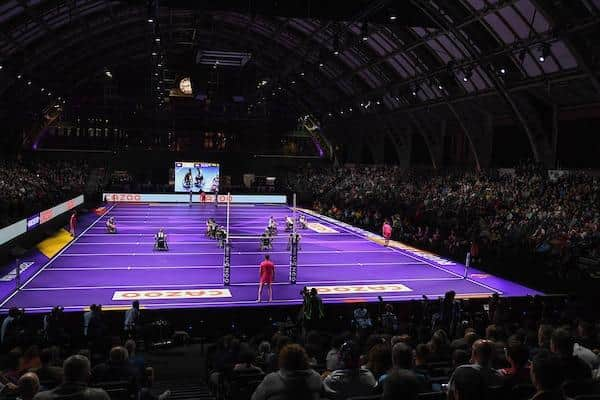Rugby League World Cup: best matches, players, moments, highs, lows and form team
and live on Freeview channel 276
England’s victory in the wheelchair event was ground-breaking for rugby league in this country and that version of the sport took the tournament by storm.
England’s women did as well as could have been realistically hoped for, reaching the semi-finals and suggesting they are beginning to close the gap on New Zealand, though champions Australia remain light years ahead. An Australia versus England final in France in three years’ time is a genuine possibility.
Advertisement
Hide AdAdvertisement
Hide AdUnfortunately, the men let themselves down on the big occasion, losing to Samoa in the last-four after a near-perfect campaign up to then.


England might be only the fourth or possibly fifth-best team in the world at the moment, but there were some promising signs and the form of some of their young players over the past month bodes well for the future.
The wheelchair and women’s competitions both attracted record crowds and there were healthy attendances for the men’s semi-finals and final.
Organisers RLWC 2021 got their ticket pricing and some of the venues wrong for the group stages. The problem then wasn’t so much the crowds - 10,000 for Australia versus Scotland in Coventry and 8,000 watching Tonga play Cook Islands at Middlesbrough is respectable - but there were too many empty seats in big stadiums.
Advertisement
Hide AdAdvertisement
Hide AdThe cost of living crisis had a bearing, as did live television broadcasting of every game. That, though, did more good than harm. The BBC’s coverage was excellent.


In terms of on-field action, there were blow-out scores in the group phase, but newcomers Jamaica and Greece in the men’s competition and Brazil women made an impression with their passion for the sport and the quality ramped up when the men reached the knockout stage and the women’s and wheelchair competitions kicked off.
The last couple of weeks produced some classic matches, such as the Tonga v Samoa and New Zealand against Fijimen’s quarter-finals and both men’s semi-finals, plus the women’s group game between Australia and New Zealand.
England’s defeat of France in the wheelchair showpiece was surely one of the best rugby league occasions this country has ever staged.
Advertisement
Hide AdAdvertisement
Hide AdThere were no major shocks, two of the three finals were contested by the same sides as five years ago and a pair of nations retained their title, but Samoa’s appearance in the men’s decider was a step forward for the sport globally.


Here’s the YEP’s choice of tournament highlights.
Team:
Brazil women. For taking part, being such good fun and the dancing.
Best single moment:
Ben Jones-Bishop, in his 300th career game, scoring Jamaica’s first World Cup try, in the final moments of a heavy loss to New Zealand.
Best occasion:
The wheelchair final at Manchester Central. Great atmosphere, record crowd, fantastic match, a ludicrous French official and England won. Unforgettable.
Best matches:
Advertisement
Hide AdAdvertisement
Hide Ad5 - Tonga v Samoa (men’s quarter-final). 80 minutes of utter intensity.
4 - New Zealand men v Fiji (men’s quarter-final). A thriller and almost a shock result.
3 - England v Samoa (men’s semi-final). Not the best quality, but incredible excitement as the hosts came back from the dead only to find a way to lose in extra-time.
2 - Australia v New Zealand (men’s semi-final). Top-class drama, outstanding skills, unbelievable defence and a tense finish.
Advertisement
Hide AdAdvertisement
Hide Ad1 - Australia v New Zealand (women’s group B). Kiwi Ferns came close to producing a huge upset in a magnificent advert for female sport.
Most surprising result:
England’s men thrashing highly-fancied Samoa 60-6 at Newcastle in the opening match.
Least surprising result:
England’s men losing 27-26 to Samoa in the last-four.
Best try:
3 - Tonga kept the ball on the last - 10 passes and a kick - for Keaon Koloamatangi to score a last-gasp winner in their group clash with Papua New Guinea.
2 - Australia winger Josh Addo-Carr’s touchdown from a kick out of the blue by Ben Hunt in the men’s semi-final against New Zealand was an absolute stonker.
Advertisement
Hide AdAdvertisement
Hide Ad1 - Alanna Fittes in the final seconds for Canada women v Brazil. Ninety-nine times out of 100 it wouldn’t happen.
Running game combined team of the tournament (not necessarily the best, but players who were fun to watch):
1 James Tedesco (Australia men), 2 Dom Young (England men), 3 Kerehitina Matua (Cook Islands women), 4 Mele Hufanga (New Zealand women), 5 Josh Addo-Carr (Australia men), 6 Jarome Luai (Samoa men), 7 Ali Brigginshaw (Australia women), 8 Tom Burgess (England men), 9 Edwin Ipape (Papua New Guinea), 10 Elsie Albert (PNG women), 11 Cameron Murray (Australia men), 12 Amber Hall (NZ Women), 13 Victory Radley (England men). Subs 14 Edna Santini (Brazil women), 15 Courtney Winfield-Hill (England women), 16 Emma Tonegato (Australia women), 17 Stephen Crichton (Samoa men).